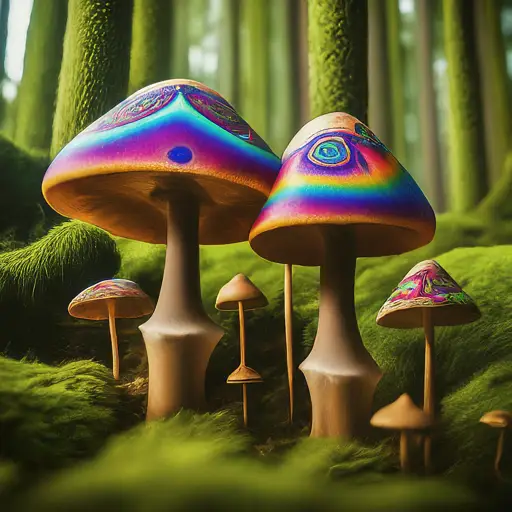The Therapeutic Potential of Psychoactive Mushrooms
Psychoactive mushrooms, containing compounds like psilocybin, have long been associated with spiritual and recreational use. However, recent research suggests that these mushrooms might hold significant therapeutic potential in addressing various mental health conditions.
Historical and Cultural Context
Psychoactive mushrooms have a rich history of use in various cultures for religious ceremonies and rituals. Ancient civilizations revered these mushrooms for their ability to induce altered states of consciousness, often believed to facilitate spiritual connection and personal growth. While Western societies initially viewed these practices with skepticism, the growing body of scientific evidence has sparked renewed interest in their potential benefits.
The Science Behind Psilocybin
Psilocybin, the primary psychoactive compound in these mushrooms, interacts with serotonin receptors in the brain, influencing perception, mood, and cognition. Research indicates that psilocybin can induce a “mystical-type” experience characterized by feelings of unity, interconnectedness, and transcendence. These experiences have been linked to positive psychological outcomes, including reduced anxiety, depression, and existential distress.
Therapeutic Applications
Preliminary studies have shown promising results in utilizing psilocybin-assisted therapy for treatment-resistant depression, anxiety disorders, addiction, and end-of-life distress in cancer patients. The mystical experiences induced by psilocybin can reportedly help individuals gain new perspectives, confront deep-seated emotional issues, and facilitate lasting behavioral change. Moreover, psilocybin appears to enhance neuroplasticity, potentially promoting the rewiring of neural pathways and leading to long-term therapeutic benefits.
Challenges and Future Directions
Despite the growing evidence, there are still challenges to overcome before psilocybin-assisted therapy can become widely accepted. Concerns about potential risks, such as adverse psychological reactions and the need for careful medical supervision, warrant further investigation. Additionally, the legal status of psilocybin remains a barrier to research and clinical implementation in many regions.
Conclusion
The therapeutic potential of psychoactive mushrooms represents a paradigm shift in the field of mental health. While more research is needed to fully understand the mechanisms and long-term effects of psilocybin, the preliminary findings are encouraging. If harnessed responsibly and integrated into existing treatment models, psilocybin-assisted therapy could offer a valuable tool in addressing the growing mental health crisis and improving the lives of countless individuals.

The Therapeutic Potential of Psychoactive Mushrooms
Psychoactive mushrooms, containing compounds like psilocybin, have long been associated with spiritual and recreational use. However, recent research suggests that these mushrooms might hold significant therapeutic potential in addressing various mental health conditions.
Historical and Cultural Context
Psychoactive mushrooms have a rich history of use in various cultures for religious ceremonies and rituals. Ancient civilizations revered these mushrooms for their ability to induce altered states of consciousness, often believed to facilitate spiritual connection and personal growth. While Western societies initially viewed these practices with skepticism, the growing body of scientific evidence has sparked renewed interest in their potential benefits.
The Science Behind Psilocybin
Psilocybin, the primary psychoactive compound in these mushrooms, interacts with serotonin receptors in the brain, influencing perception, mood, and cognition. Research indicates that psilocybin can induce a “mystical-type” experience characterized by feelings of unity, interconnectedness, and transcendence. These experiences have been linked to positive psychological outcomes, including reduced anxiety, depression, and existential distress.
Therapeutic Applications
Preliminary studies have shown promising results in utilizing psilocybin-assisted therapy for treatment-resistant depression, anxiety disorders, addiction, and end-of-life distress in cancer patients. The mystical experiences induced by psilocybin can reportedly help individuals gain new perspectives, confront deep-seated emotional issues, and facilitate lasting behavioral change. Moreover, psilocybin appears to enhance neuroplasticity, potentially promoting the rewiring of neural pathways and leading to long-term therapeutic benefits.
Challenges and Future Directions
Despite the growing evidence, there are still challenges to overcome before psilocybin-assisted therapy can become widely accepted. Concerns about potential risks, such as adverse psychological reactions and the need for careful medical supervision, warrant further investigation. Additionally, the legal status of psilocybin remains a barrier to research and clinical implementation in many regions.
Conclusion
The therapeutic potential of psychoactive mushrooms represents a paradigm shift in the field of mental health. While more research is needed to fully understand the mechanisms and long-term effects of psilocybin, the preliminary findings are encouraging. If harnessed responsibly and integrated into existing treatment models, psilocybin-assisted therapy could offer a valuable tool in addressing the growing mental health crisis and improving the lives of countless individuals.



